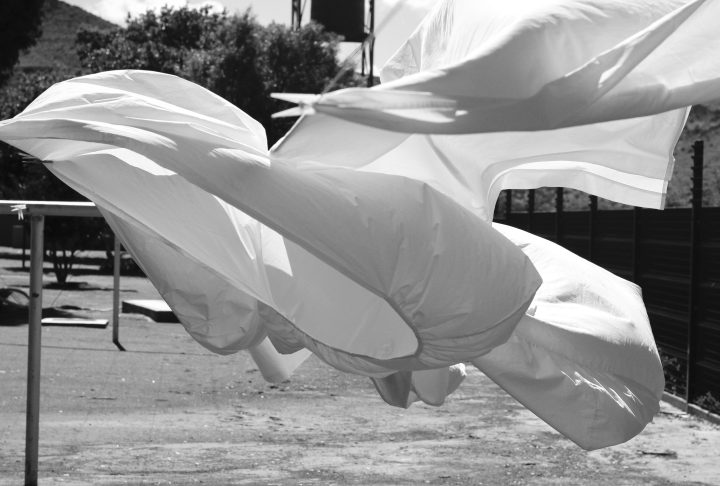THE CONVERSATION
How often should you wash your sheets and towels?

While every week or two will generally suffice for sheets, towels are best washed every few days. A microbiologist explains.
Everyone seems to have a different opinion when it comes to how often towels and bed sheets should be washed. While many people might wonder whether days or weeks is best, in one survey from the United Kingdom, almost half of single men reported not washing their sheets for up to four months at a time.
It’s fairly clear that four months is too long to leave it, but what is the ideal frequency?
Bed linen and towels are quite different and so should be washed at different intervals. While every week or two will generally suffice for sheets, towels are best washed every few days.
Anyway, who doesn’t love the feeling of a fresh set of sheets or the smell of a newly laundered towel?
Why you should wash towels more often
When you dry yourself, you deposit thousands of skin cells and millions of microbes onto the towel. And because you use your towel to dry yourself after a shower or bath, your towel is regularly damp.
You also deposit a hefty amount of dead skin, microbes, sweat and oils onto your sheets every night. But unless you’re a prolific night sweater, your bedding doesn’t get wet after a night’s sleep.
Towels are also made of a thicker material than sheets and therefore tend to stay damp for longer.
So what is it about the dampness that causes a problem? Wet towels are a breeding ground for bacteria and moulds. Moulds especially love damp environments. Although mould won’t necessarily be visible (you would need significant growth to be able to see it) this can lead to an unpleasant smell.
As well as odours, exposure to these microbes in your towels and sheets can cause asthma, allergic skin irritations, or other skin infections.
So what’s the ideal frequency?
For bedding, it really depends on factors such as whether you have a bath or shower just before going to bed, or if you fall into bed after a long, sweaty day and have your shower in the morning. You will need to wash your sheets more regularly in the latter case. As a rule of thumb, once a week or every two weeks should be fine.
Towels should ideally be washed more regularly – perhaps every few days – while your facecloth should be cleaned after every use. Because it gets completely wet, it will be wet for a longer time, and retain more skin cells and microbes.
Wash your towels at a high temperature (for example, 65°C) as that will kill many microbes. If you are conscious of saving energy, you can use a lower temperature and add a cup of vinegar to the wash. The vinegar will kill microbes and prevent bad smells from developing.
Clean your washing machine regularly and dry the fold in the rubber after every wash, as this is another place microbes like to grow.
Smelly towels
What if you regularly wash your towels, but they still smell bad? One of the reasons for this pong could be that you’ve left them in the washing machine too long after the wash. Especially if it was a warm wash cycle, the time they’re warm and damp will allow microbes to happily grow. Under lab conditions the number of these bacteria can double every 30 minutes.
It’s important to hang your towel out to dry after use and not to leave towels in the washing machine after the cycle has finished. If possible, hang your towels and bedding out in the sun. That will dry them quickly and thoroughly and will foster that lovely fresh, clean cotton smell. Using a dryer is a good alternative if the weather is bad, but outdoors in the sun is always better if possible.
Also, even if your towel is going to be washed, don’t throw a wet towel into the laundry basket, as the damp, dirty towel will be an ideal place for microbes to breed. By the time you get to doing your washing, the towel and the other laundry around it may have acquired a bad smell. And it can be difficult to get your towels smelling fresh again.
What about ‘self-cleaning’ sheets and towels?
Some companies sell “quick-dry” towels or “self-cleaning” towels and bedding. Quick-dry towels are made from synthetic materials that are weaved in a way to allow them to dry quickly. This would help prevent the growth of microbes and the bad smells that develop when towels are damp for long periods of time.
But the notion of self-cleaning products is more complicated. Most of these products contain nanosilver or copper, antibacterial metals that kill micro-organisms. The antibacterial compounds will stop the growth of bacteria and can be useful to limit smells and reduce the frequency with which you need to clean your sheets and towels.
However, they’re not going to remove dirt like oils, skin flakes and sweat. So as much as I would love the idea of sheets and towels that clean themselves, that’s not exactly what happens.
Also, excessive use of antimicrobials such as nanosilver can lead to microbes becoming resistant to them. DM
This story was first published on The Conversation. Rietie Venter is an Associate professor in Clinical and Health Sciences at the University of South Australia.




















 Become an Insider
Become an Insider
The British pilot who was ambushed tortured and left penniless at the Melrose Arch incident. What further news have the authorities to say about this incident
Sounds a bit extreme to me. I grew up in the bush of what was then Southern Rhodesia, spent most of my school days in boarding schools, sharing hostel dormitories with as many as 20 other boys with who-knows-what ailments. And sharing ablutions with as many as 40 other boys with dubious hygiene habits. As a child, I rolled in the dirt wrestling with my brother, or with family dogs, or playing with cats … Microbes? Who knew about microbes then? I never got sick back then, despite what various hostel matrons prepared as food.
I’ve lived in communal digs that probably never got thoroughly cleaned from one week to the next. Microbes, anyone? As a young man, I hitch-hiked all over southern Africa, getting into and out of cars with countless strangers from every walk of life (including a couple of wild looking men in Mozambique with their gangsta molls, all armed to the teeth, and one ride in a Rolls Royce) and sometimes sleeping on the side of the road. I never got sick.
I’m 72-years-old and the only times I’ve been hospitalized is as a result of a car accident, a motorcycle accident, and for a hernia op. In all cases, I was in one day and out the next. I still have my appendix, tonsils, and all my wits and faculties. Microbes? I’m sure we’re on intimate terms, but rashes, skin infections and such like seem to avoid me. However, I never touch the handrails on escalators. After all, who knows what microbes lurk in pubic places.
To be fair to sounds like microbes were well down the page on the list of risks!
Lovely post! I too am not a germ freak and believe it is the best way to be. A scientist said in an interview on Youtube on microbes that there are more microbes on your thumb than people living in London, and somehow we all survive!